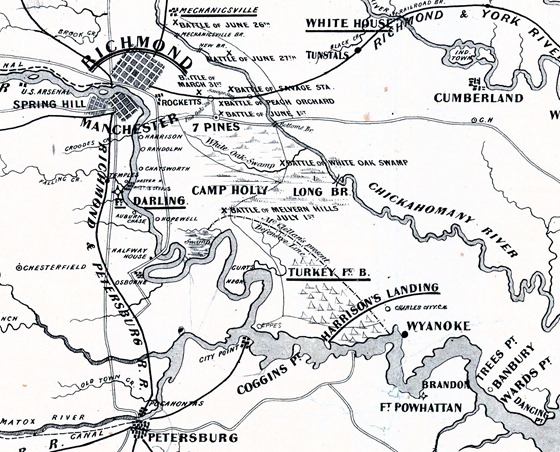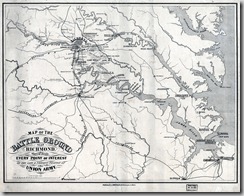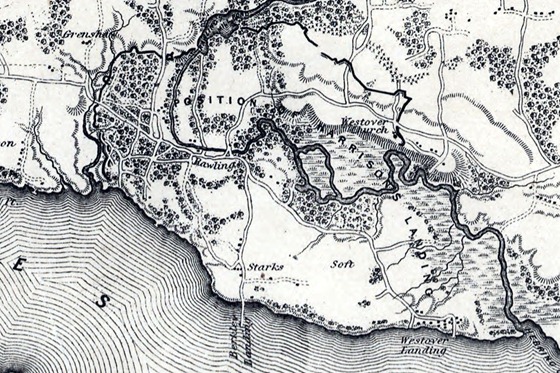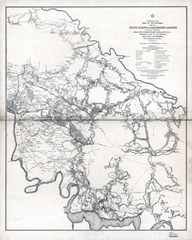Thursday, July 24th.
Yes; that must be the date, for one day and two nights have passed since I was writing here. Where shall I begin the story of my wanderings? I don’t know that it has a beginning, it is all so hurried and confused.
But it was Tuesday evening that the Federals were seized with a panic which threw the whole town in alarm. They said our troops were within eight miles, ten thousand in number. The report was even started that the advance guard was skirmishing with the Federals; the shots were heard distinctly, a dozen people were ready to swear. The Yankees struck their tents, galloped with their cannon through the streets with the most terrific din, troops passed at double-quick on their way to the Garrison, everything was confusion. Mr. Tunnard told us yesterday he was present when part of them reached the gate of the Garrison, and saw one of the officers spring forward, waving his sword, and heard him cry, “Trot, men! Gallop, I say! Damn you! run in!” —with a perfect yell at the close; whereupon all lookers-on raised a shout of laughter, for the man was frightened out of his wits. A Federal officer told him that their fright was really a disgrace; and if one thousand of our men had come in town, the whole thirty-five hundred would have been at their mercy. Even the naval officers denounce it as a most arrant piece of cowardice; for instead of marching their troops out to meet ours, they all rushed into the Garrison, where, if attacked, their only retreat would have been into the river. The gunboats were ordered into the middle of the stream, in front of the Garrison; and cooped up there, these valiant men awaited the assault in such trepidation that yesterday they freely said the force could be purchased for fifty cents, they are so ashamed of their panic.
Imagine what effect this had on the inhabitants! Soon, an exodus took place, in the direction of the Asylum, and we needs must follow the general example and run, too. In haste we packed a trunk with our remaining clothes, — what we could get in, — and the greatest confusion prevailed for an hour. Beatrice had commenced to cry early in the evening, and redoubled her screams when she saw the preparations; and Louis joining in, they cried in concert until eight o’clock, when we finally got off. What a din! Lilly looked perfectly exhausted; that look on her face made me heartsick. Miriam flew around everywhere; mother always had one more article to find, and the noise was dreadful, when white and black assembled in the hall ready at last. Charlie placed half of the trunks on the dray, leaving the rest for another trip; and we at last started off. Besides the inevitable running-bag, tied to my waist, on this stifling night I had my sunbonnet, veil, comb, toothbrush, cabas filled with dozens of small articles, and dagger to carry; and then my heart failed me when I thought of my guitar, so I caught it up in the case; and remembering father’s heavy inkstand, I seized that, too, with two fans. If I was asked what I did with all these things, I could not answer. Certain it is I had every one in my hands, and was not very ridiculous to behold.
Seventeen in number, counting white and black, our procession started off, each loaded in their own way. The soldiers did not scruple to laugh at us. Those who were still waiting in front of the churches to be removed laughed heartily, and cried, “Hello! Where are you going? Running? Good-bye!” Fortunately they could not see our faces, for it was very dark. One stopped us under a lamp-post and wanted us to go back. He said he knew we were to be attacked, for the Confederates were within five miles; but we were as safe at home as at the Asylum. He was a very handsome, respectable-looking man, though dirty, as Yankee soldiers always are, and in his shirt-sleeves besides. We thanked him for his kindness, and went on. All stopped at the Brunots’, to see that they were ready to fly; but the two parties were so tremendous that we gladly divided, and Miriam and I remained with them until they could get ready, while our detachment went on.
Wagons, carts, every vehicle imaginable, passed on to places of safety, loaded with valuables, while women and children hurried on, on foot. It took the Brunots as long to prepare as it did us. I had to drag Sophie out of her bed, where she threw herself, vowing she would not run; and after an interminable length of time, we were at last ready and started, with the addition of Mrs. Loucks and her sons in our train. The volunteer, whose sole duty seems to be to watch the Brunots, met us as we got out. He stopped as he met the first, looked in silence until Sophie and I passed, and then burst out laughing. No wonder! What a walk it was! Nobody hesitated to laugh, even though they meant to run themselves, and we made fun of each other, too, so our walk was merry enough.
When we reached there, the Asylum was already crowded — at least, it would have been a crowd in any other place, though a mere handful in such a building. The whole house was illuminated, up to the fifth story, and we were most graciously received by the director, who had thrown the whole house open to whoever chose to come, and exerted himself to be accommodating. It looked like a tremendous hotel where every one is at home; not a servant or one of the deaf and dumb children was to be seen; we had all the lower story to ourselves. Was n’t it pleasant to unload, and deposit all things in a place of safety! It was a great relief. Then we five girls walked on the splendid balcony which goes around the house until we could no longer walk, when I amused myself by keeping poor Sophie standing, since she would not sit down like a Christian, but insisted on going to bed like a lazy girl, as she is. When I finally let her go, it did not take her many minutes to undress, and soon we were all ready for bed. The Brunots had beds on the parlor floor; across the wide hall, we had a room opposite; and next to ours, Lilly and the children were all sleeping soundly. I ran the blockade of the hall in my nightgown, and had a splendid romp with the girls after rolling Sophie out of bed, and jerking Nettie up. Mother and Mrs. Brunot cried, “Order,” laughing, but they came in for their share of the sport, until an admiring crowd of females at the door told us by their amused faces they were enjoying it, too; so I ran the gauntlet again, and got safely through the hall, and after a few more inroads, in one of which Miriam accompanied me, and on which occasion I am sure we were seen in our nightgowns, we finally went to bed. I won’t say went to sleep, for I did not pretend to doze. All our side of the house had bars, except me; and the mosquitoes were unendurable; so I watched mother and Miriam in their downy slumbers and lay on my hard bed for hours, fighting the torments with bare arms.
Every now and then I heard a stir among the females above, indicating that some few were anticipating a panic. Once they took a rush from the fourth story, and cried they heard the cannon; twenty guns had been fired, etc. I lay still, determined not to believe it; and presently all subsided. I lay there for hours longer, it seemed, when Nettie at last wandered in disconsolate to find if we were asleep; for with the exception of Sophie, they, too, had been awake all night. I went to the parlor with her, when she, Dena, and I, decided to dress at once and sit on the balcony, since sleep was hopeless. Behold me in a blue muslin flounced to the waist, with a cape, too! What a running costume! Miriam only had time to take off her white dress before starting. All dressed, we went to the northwest corner, as far as possible from the rest of the household, and sat in a splendid breeze for hours. It was better than fighting insatiable mosquitoes; so there we sat talking through the greater part of a night which seemed to have borrowed a few additional hours for our benefit. We’ll have no Leap Year in ’64; the twenty-four extra hours were crowded in on that occasion, I think.
We discussed our favorite books, characters, authors, repeated scraps here and there of the mock sentimental, talked of how we would one day like to travel, and where we would go; discussed love and marriage, and came to the conclusion neither was the jest it was thought to be. (O wise young women!) Poor Nettie retired in despair, and we two watched alone for hours longer. The sun must have been arrested by some Joshua on the road; could n’t make me believe it was doing its duty as usual. We wandered around the balconies, through the grounds in the dim starlight (for it was cloudy), and finally, beholding a faint promise of morning, sat still and waited for the coming of the lazy sun. What was still more aggravating was that every time we looked in at the others showed them sleeping peacefully. Miriam lay her full length with outstretched arms, the picture of repose, looking so comfortable! When the sun finally made his appearance (he was out on a spree, I found, for his eyes were not half opened, and he looked dull and heavy as he peeped from behind his bed curtains), others began to stir, and in an hour more, we were ready to leave. Those who had slept, came out with swelled eyes and drowsy looks; while we three, who had been up all night, were perfectly calm, though rather pale; but I am seldom otherwise.
Were we not thankful to see home still standing! I did not feel tired much, but somehow, when it struck half-past six, and I found myself alone here (Miriam having stopped at Mrs. Day’s), I suddenly found myself divested of my flounces, and most other articles, and involuntarily going towards the bed. I could not sleep, was n’t thinking of such a thing; meant to — there was an end of my soliloquy! Where I went, I don’t know. As the clock struck eight, I got up as unaccountably, and discovered I had lost all idea of time in sleep. If it had not been for the clock, I should have said I had slept a day and a night, and it was now Thursday morning. A giant refreshed, I rose from my slumbers, took a hasty cup of coffee, and set to work packing Lilly’s trunk, for I was crazy to see the children off as soon as possible.
It was no short work, but we all hurried, said goodbye, and saw them go with a feeling of relief. By the experience of the night before, we knew that when the real moment came it would be impossible to get them off in time to escape danger. Poor Lilly! we miss her sadly; but are thankful to know that she is out of danger with her poor little children. She looked heartbroken at the idea of leaving us alone; but then, when one weak woman has five small babies to take care of, is it fair to impose three big ones on her? I ‘d never stay here, if she sacrificed her children to take care of us who need no protection. I was very lazy after they left; and sat reading until a note was brought from Charlie saying they were safe beyond the lines.
Last night came another alarm. Some fifty cannon were fired somewhere above, reports came that a body of our troops were a few miles out, so a thousand of these men took courage and went out to reconnoitre. Mrs. Brunot and mother insisted on going again to the Asylum for protection against the coming attack, though we at first begged and pleaded to stay at home. But we had to follow, and I don’t think any of us were in the best of humors, as we were all conscious of doing a foolish thing.
We were cordially received again, and got quite gay. Sleeping accommodations no better than before, as far as I was concerned. Sophie, Miriam, and I had but one bar between us, so we placed two mattresses side by side, and by dint of chairs and strings, stretched the net as far as possible over them. Those two were well enough; but to my share fell a baby’s mattress two feet by four, placed between the wall and the other great bed, with the end of the bar a foot above my face, and one sheet to do the duty of two — however, they had only one, also. Well! I believe I am tall, so my bed did not fit me. As it was two inches higher than theirs, there was no sharing. In spite of a heavy rain that was now pouring, my warm place was intolerable, and the perspiration streamed from my face so as to be disagreeable, to say the least. It drove me to walk in my sleep, I am afraid, for I have an indistinct recollection of finding myself standing at the window trying to breathe. It was a very, very little piece of sleep I got after all, and that little by no means refreshing.
Up at sunrise again, but it took some time to get ready, for I had to get some clothes out of the trunk, to send home. Well, ever since I reached here I have been writing, and I am ashamed to say how long it is. As the time grows more exciting, my book grows shorter, to my great distress. What will I do?
We all vowed that would be the last time we would run until we heard the cannon, or had some better reason than a Yankee panic to believe the Confederates were coming; though if we listened to mother, she would go there every night if this lasted for a whole year. Kind Phillie Nolan wrote insisting on our staying with them on the plantation until it was over, but we cannot do it; the time is too uncertain; if we knew it was to come this week, we might stay that long with her; but to go for an indefinite period, Miriam and I would not hear of.
I have kept for the last a piece of news I received with thankfulness, when I finally heard it; for, though known to the whole family and all the town on Tuesday night, no one thought it worth while to tell me until I heard it by accident last evening. It was that a Mr. Bell, writing to his wife, says Gibbes asked him to send word to mother that he, George, and Jimmy were in the fight of the 10th and 11th, and all safe. God be praised!













